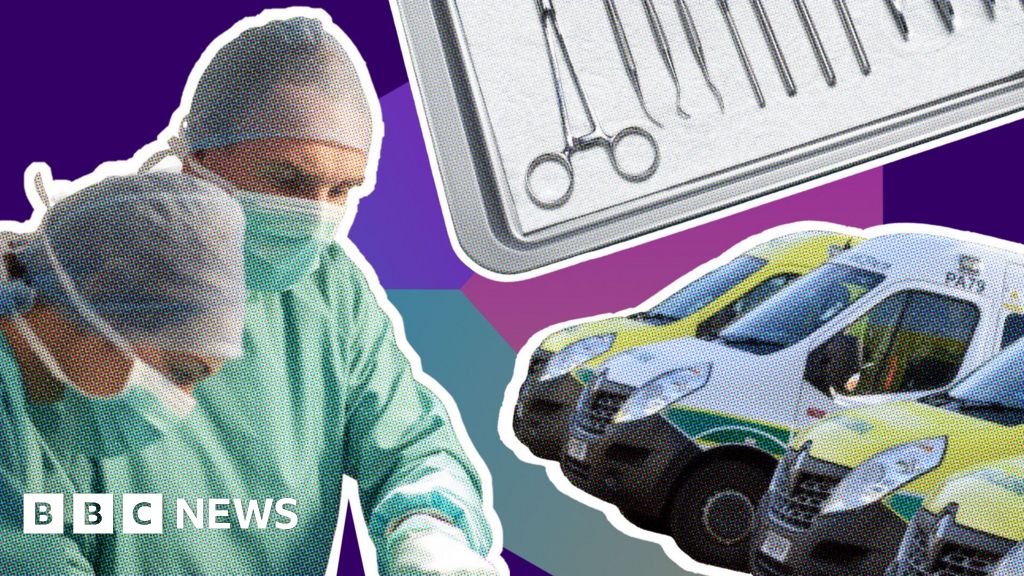Football
Why has the Welsh NHS become a general election football? – BBC News

- Author, Owain Clarke
- Role, Health correspondent, BBC Wales News
Politicians are often accused of blurring the lines about who is responsible for what – especially when it comes to the health service.
But whoever wins the UK general election will not be responsible for the NHS in Wales.
That’s because health is devolved in Wales, meaning it is the responsibility of the Welsh government.
So why has the Welsh health service become an issue during the general election campaign?
1. Public interest
First up, because people say they are interested in it.
Surveys consistently suggest health is one of the top issues, if not the top priority, for voters in Wales.
This is seemingly regardless of whether they are electing politicians to the House of Commons in Westminster or the Senedd in Cardiff Bay.
2. Money
Decisions made by the future UK government about how it spends its cash could have an influence over future Welsh health policies.
In particular, choices around funding public services in England will determine how much money comes to Wales.
It will be up to ministers in Cardiff to decide how to spend the money they receive in this way.
But given that spending on health and social care now accounts for way more than half of the Welsh government’s total budget, money really does matter.
3. Labour’s record
Parties like the Conservatives, Plaid Cymru, Lib Dems, Reform and others are eager to question Labour’s record on health, in the nation where it has been running the NHS for 25 years.
How did the NHS begin?
The NHS – short for National Health Service – was established in 1948.
The former Labour health minister, Tredegar MP Aneurin Bevan, is considered to be the person who led the way in its creation.
Bevan was inspired by an insurance scheme in his hometown of Tredegar where workers pooled a proportion of their pay to cover the costs of healthcare for themselves and their families.
In 1969, legislation was passed that separated the Welsh NHS from the English NHS, and it was put under the control of a separate UK government department – the Welsh Office.
This meant the Welsh NHS had more control over how it worked and, in theory, more room to make distinct Welsh policies – although the ministers in charge would always be from the party that formed the UK government.
When was health devolved in Wales?
In 1997, the people of Wales voted by the narrowest of margins for devolution.
This led to the establishment of what was then called the Welsh Assembly (renamed the Welsh Parliament in 2020), with health – in all but a very small number of areas – becoming the responsibility of Welsh ministers.
Over the past 25 years, some distinct choices have been made by the Welsh government – which has always been led by Labour.
Scrapping prescription charges, phasing out hospital car parking charges, establishing an Older People’s Commissioner, and becoming the first UK nation to introduce opt-out organ donation have been some of Wales’ most high profile changes.
Now Welsh ministers want to push ahead more quickly than other UK nations on plans to restrict meal deals that are high in fat, salt and sugar.
But it was during the Covid-19 pandemic that it became clear to most people that Wales could make different choices – even decisions as momentous as limiting our freedoms to move and meet with things like lockdowns and bubbles.
Image source, Getty Images
‘Line between life and death’
Since devolution, how the Welsh health service compares to England’s has been subject to fierce debate, particularly during election periods.
In 2014, the then Conservative prime minister David Cameron attacked what he described as Labour’s “dreadful” record in running the Welsh health service, by describing the Offa’s Dyke footpath as the “dividing line between life and death“.
The Daily Mail then published a series of articles which it claimed showed the Welsh NHS was in “meltdown”.
In response, the then Labour health minister Mark Drakeford described the attacks on the Welsh NHS as a “tissue of lies”.
Perhaps the most definitive analysis came two years later, when the Organisation for Economic Co-operation and Development (OECD), an influential international organisation, looked in detail at the performance of the NHS in Wales, England, Scotland and Northern Ireland.
It concluded that “no consistent picture emerges of one of the United Kingdom’s four health system performing better than another” and argued that all four could learn from each other and make big improvements.
Some experts have warned that those lessons are harder to learn when the NHS is so frequently used as a “political football”.
What do the parties say?
A Welsh Labour spokesperson said the Welsh government’s budget was “£700m worse-off following Tory chaos and their mismanagement of the economy”, but said its priority was “getting long waiting times down”.
The Welsh Conservatives said the Welsh government had “mismanaged the Welsh NHS for 25 years”, adding that it would “spend every penny Wales receives as a result of health spending in England, on health”.
Plaid Cymru said the Welsh NHS had “suffered from Tory cuts and Labour mismanagement”, adding that it wanted “a fairer funding system from Westminster” and to recruit an extra 500 GPs.
Reform UK said it planned to offer tax relief on private healthcare “to reduce NHS pressure”.
The Lib Dems said the party would pledge an extra £760m in funding to the Welsh budget each year.
Additional reporting by Rosie Mercer










